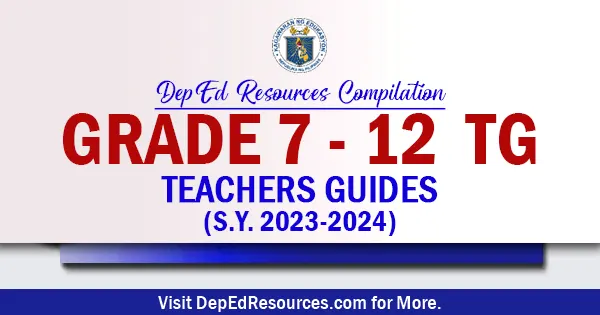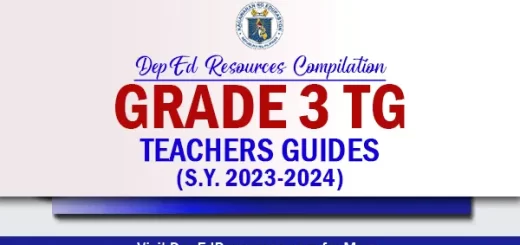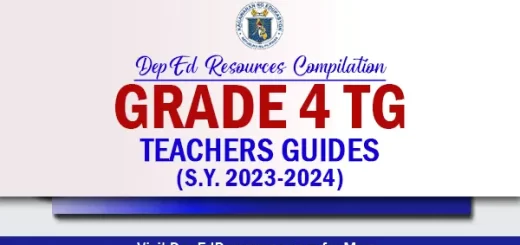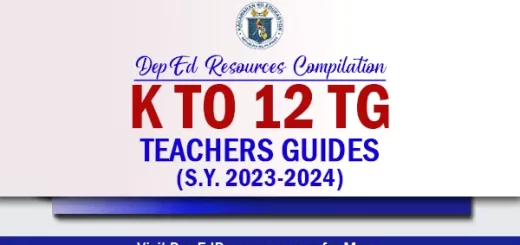Grade 7 to 12 Teachers Guide | K to 12 Curriculum
More Grade 7 to 12 Teachers Guides will be uploaded soon. You can always visit this page to check for newly uploaded files. Thank you.
Mathematics is one subject that pervades life at any age and in any circumstance. Thus, its value goes beyond the classroom and the school. Mathematics as a school subject, therefore, must be learned comprehensively and with much depth.
The twin goals of mathematics in the basic education levels, K-10, are Critical Thinking and Problem Solving.
Critical thinking, according to Scriven and Paul (1987) is the intellectually disciplined process of actively and skilfully conceptualizing, applying, analyzing, synthesizing, and/or evaluating information gathered from, or generated by, observation, experience, reflection, reasoning, or communication, as a guide to belief and action.
On the other hand, according to Polya (1945 & 1962), mathematical problem solving is finding a way around a difficulty, around an obstacle, and finding a solution to a problem that is unknown.
These two goals are to be achieved with an organized and rigorous curriculum content, a well-defined set of high-level skills and processes, desirable values and attitudes, and appropriate tools, taking into account the different contexts of Filipino learners.
There are five content areas in the curriculum, as adopted from the framework prepared by MATHTED & SEI (2010): Numbers and Number Sense, Measurement, Geometry, Patterns and Algebra, and Probability and Statistics.
The specific skills and processes to be developed are: knowing and understanding; estimating, computing and solving; visualizing and modelling; representing and communicating; conjecturing, reasoning, proving and decision-making; and applying and connecting.
The following values and attitudes are to be honed as well: accuracy, creativity, objectivity, perseverance, and productivity.
We recognize that the use of appropriate tools is necessary in teaching mathematics. These include: manipulative objects, measuring devices, calculators and computers, smart phones and tablet PCs, and the Internet.
We define context as a locale, situation, or set of conditions of Filipino learners that may influence their study and use of mathematics to develop critical thinking and problem solving skills. Contexts refer to beliefs, environment, language and culture that include traditions and practices, as well as the learner’s prior knowledge and experiences.
The framework is supported by the following underlying learning principles and theories: Experiential and Situated Learning, Reflective Learning, Constructivism,
Cooperative Learning and Discovery and Inquiry-based Learning. The mathematics curriculum is grounded in these theories.
Experiential Learning as advocated by David Kolb is learning that occurs by making sense of direct everyday experiences. Experiential Learning theory defines learning as “the process whereby knowledge is created through the transformation of experience. Knowledge results from the combination of grasping and transforming experience” (Kolb, 1984, p. 41). Situated Learning, theorized by Lave and Wenger, is learning in the same context in which concepts and theories are applied.
Reflective Learning refers to learning that is facilitated by reflective thinking. It is not enough that learners encounter real-life situations. Deeper learning occurs when learners are able to think about their experiences and process these, allowing them the opportunity to make sense of and derive meaning from their experiences.
Constructivism is the theory that argues that knowledge is constructed when the learner is able to draw ideas from his/her own experiences and connect them to new ideas.
Cooperative Learning puts premium on active learning achieved by working with fellow learners as they all engage in a shared task. The mathematics curriculum allows for students to learn by asking relevant questions and discovering new ideas. Discovery Learning and Inquiry-based Learning (Bruner, 1961) support the idea that students learn when they make use of personal experiences to discover facts, relationships, and concepts.

Grade 7 to 12 Teachers Guide | K to 12 Curriculum
Grade 7 Teachers Guide | K to 12 Curriculum
- GRADE 7 Teacher’s Guide in ARALING PANLIPUNAN
- GRADE 7 Teacher’s Guide in ENGLISH
- GRADE 7 Teacher’s Guide in ESP
- GRADE 7 Teacher’s Guide in MATHEMATICS
- GRADE 7 Teacher’s Guide in SCIENCE
MAPEH 7 Teachers Guide | K to 12 Curriculum
- GRADE 7 Teacher’s Guide in MUSIC – Quarter 1 & 2
- GRADE 7 Teacher’s Guide in ARTS – Quarter 1 & 2
- GRADE 7 Teacher’s Guide in PE
- GRADE 7 Teacher’s Guide in HEALTH
T.L.E 7 Teachers Guide | K to 12 Curriculum
- Teacher’s Guide in Animal Production
- Teacher’s Guide in Aquaculture
- Teacher’s Guide in Automotive
- Teacher’s Guide in Bread and Pastry
- Teacher’s Guide in Caregiving
- Teacher’s Guide in Carpentry
- Teacher’s Guide in Commercial Cooking
- Teacher’s Guide in Crop Production
- Teacher’s Guide in Dressmaking and Tailoring
- Teacher’s Guide in Electrical
- Teacher’s Guide in Electronics
- Teacher’s Guide in Entrep-based Desktop Publishing
- Teacher’s Guide in Entrep-based PC Hardware Servicing
- Teacher’s Guide in Entrep-based Photo Editing
- Teacher’s Guide in Entrep-based Technical Drafting
- Teacher’s Guide in Food (Fish) Processing
- Teacher’s Guide in Handicrafts
- Teacher’s Guide in Horticulture
- Teacher’s Guide in Household Services
- Teacher’s Guide in Masonry
- Teacher’s Guide in Mechanical Drafting
- Teacher’s Guide in Nail Care
- Teacher’s Guide in PC Hardware Servicing
- Teacher’s Guide in Plumbing
- Teacher’s Guide in RAC Servicing
- Teacher’s Guide in SMAW Welding
- Teacher’s Guide in Tiles Setting
GRADE 8 Teachers Guide | K to 12 Curriculum
- GRADE 8 Teacher’s Guide in ARALING PANLIPUNAN
- GRADE 8 Teacher’s Guide in ENGLISH
- GRADE 8 Teacher’s Guide in ESP
- GRADE 8 Teacher’s Guide in FILIPINO – Quarter 2
- GRADE 8 Teacher’s Guide in FILIPINO – Quarter 3
- GRADE 8 Teacher’s Guide in MATHEMATICS
- GRADE 8 Teacher’s Guide in SCIENCE
MAPEH 8 Teachers Guide | K to 12 Curriculum
- GRADE 8 Teacher’s Guide in MUSIC– Quarter 3
- GRADE 8 Teacher’s Guide in MUSIC– Quarter 4
- GRADE 8 Teacher’s Guide in ART – Quarter 2
- GRADE 8 Teacher’s Guide in ART – Quarter 3
- GRADE 8 Teacher’s Guide in PE – Quarter 1
- GRADE 8 Teacher’s Guide in PE – Quarter 3
- GRADE 8 Teacher’s Guide in HEALTH – Quarter 3
T.L.E 8 Teachers Guide | K to 12 Curriculum
- Teacher’s Guide in Animal Production
- Teacher’s Guide in Aquaculture
- Teacher’s Guide in Automotive
- Teacher’s Guide in Bread and Pastry
- Teacher’s Guide in Care-giving
- Teacher’s Guide in Carpentry
- Teacher’s Guide in Commercial Cooking
- Teacher’s Guide in Crop Production
- Teacher’s Guide in Dressmaking and Tailoring
- Teacher’s Guide in Electrical
- Teacher’s Guide in Electronics
- Teacher’s Guide in Entrep-based Desktop Publishing
- Teacher’s Guide in Entrep-based PC Hardware Servicing
- Teacher’s Guide in Entrep-based Photo Editing
- Teacher’s Guide in Entrep-based Technical Drafting
- Teacher’s Guide in Food (Fish) Processing
- Teacher’s Guide in Handicrafts
- Teacher’s Guide in Horticulture
- Teacher’s Guide in Household Services
- Teacher’s Guide in Masonry
- Teacher’s Guide in Mechanical Drafting
- Teacher’s Guide in Nail Care
- Teacher’s Guide in PC Hardware Servicing
- Teacher’s Guide in Plumbing
- Teacher’s Guide in RAC Servicing
- Teacher’s Guide in SMAW Welding
- Teacher’s Guide in Tiles Setting
GRADE 9 Teachers Guide | K to 12 Curriculum
- GRADE 9 Teacher’s Guide in ENGLISH
- GRADE 9 Teacher’s Guide in ESP
- GRADE 9 Teacher’s Guide in FILIPINO
- GRADE 9 Teacher’s Guide in MATHEMATICS
- GRADE 9 Teacher’s Guide in SCIENCE
MAPEH 9 Teachers Guide | K to 12 Curriculum
- GRADE 9 Teacher’s Guide in MUSIC
- GRADE 9 Teacher’s Guide in ART
- GRADE 9 Teacher’s Guide in PE
- GRADE 9 Teacher’s Guide in HEALTH
GRADE 10 Teachers Guide | K to 12 Curriculum
ECONOMICS Teachers Guide | K to 12 Curriculum
- GRADE 10 Teacher’s Guide in EKONOMIKS – Quarter 1
- GRADE 10 Teacher’s Guide in EKONOMIKS – Quarter 2
- GRADE 10 Teacher’s Guide in EKONOMIKS – Quarter 3
- GRADE 10 Teacher’s Guide in EKONOMIKS – Quarter 4
ESP Teachers Guide | K to 12 Curriculum
- GRADE 10 Teacher’s Guide in ESP – Quarter 2
- GRADE 10 Teacher’s Guide in ESP – Quarter 3
- GRADE 10 Teacher’s Guide in ESP – Quarter 4
FILIPINO Teachers Guide | K to 12 Curriculum
- GRADE 10 Teacher’s Guide in FILIPINO – Quarter 1
- GRADE 10 Teacher’s Guide in FILIPINO – Quarter 2
- GRADE 10 Teacher’s Guide in FILIPINO – Quarter 3
- GRADE 10 Teacher’s Guide in FILIPINO – Quarter 4
MAPEH Teachers Guide | K to 12 Curriculum
- GRADE 10 Teacher’s Guide in PE – Quarter 1
- GRADE 10 Teacher’s Guide in PE – Quarter 2
- GRADE 10 Teacher’s Guide in PE – Quarter 3
- GRADE 10 Teacher’s Guide in PE – Quarter 4
- GRADE 10 Teacher’s Guide in HEALTH – Quarter 1
- GRADE 10 Teacher’s Guide in HEALTH – Quarter 2
- GRADE 10 Teacher’s Guide in HEALTH – Quarter 3
- GRADE 10 Teacher’s Guide in HEALTH – Quarter 4
MATHEMATICS Teachers Guide | K to 12 Curriculum
- GRADE 10 Teacher’s Guide in MATHEMATICS – Quarter 1
- GRADE 10 Teacher’s Guide in MATHEMATICS – Quarter 2
- GRADE 10 Teacher’s Guide in MATHEMATICS – Quarter 3
- GRADE 10 Teacher’s Guide in MATHEMATICS – Quarter 4
SCIENCE Teachers Guide | K to 12 Curriculum
- GRADE 10 Teacher’s Guide in SCIENCE – Quarter 1
- GRADE 10 Teacher’s Guide in SCIENCE – Quarter 2
- GRADE 10 Teacher’s Guide in SCIENCE – Quarter 3
- GRADE 10 Teacher’s Guide in SCIENCE – Quarter 4
MORE FREE TO DOWNLOAD FILES HERE
Budget of Work | Bulletin Board Display | Curriculum Guide | Daily Lesson Log | DepEd Announcements | DepEd Memo | DepEd News | DepEd Official Statements | DepEd Order | DepEd Press Releases | Designs and Templates | Detailed Lesson Plan | Diagnostic Test | Download Files Here | Exams | Forms | Graduation | Instructional Materials | Latest News | Latest! | Learners Material | Periodical Tests | Powerpoint Presentations | Reviewers | RPMS | School Forms | Summative Test | Teachers Guide | Teachers Manuals | Teachers Tools | Weekly Daily Lesson Log | Workbooks
These daily lesson log were made in compliance with the Department of Education format.
DepEd Resources credits these files to all the owners and authors as well as those who sent us this files for posting. We will always be thankful of you. You make DepEd Resources possible for our beloved teachers .
Please LIKE and SHARE so everyone would benefit from these files. Thank you!
LIKE US on Facebook! Click Here.
“I cannot do all the good that the world needs. But the world needs all the good that I can do.”
―
















Module 1, Overcoming challenges: … English 10 Teacher‘s Guide Unit 1 … Grade Level Grade 10 Learning Area …
Why is it that there is no Teaching Guide for Food and Beverage Services fr Grade 7 or 8? I am looking forward to see a copy of it soon. thank u so much.
Mam do you a copy teaching guide or curriculum guide for FBS 7/8? Pls share your copy mam.. thank you